The elections of May 2014 saw the 10-year old UPA government suffer a crushing defeat and the Narandra Modi-led NDA come to power on a wave of support. In the eighteen months that have elapsed since then, there has been much thunder and lightening, mostly from the media, about the failings and victories of the NDA government, on a host of issues, precious few of which actually have to do with what they were elected to do, viz. govern the country.

So let us look at the actual economic reforms initiated by the government and try to understand the implications of each for India.
FDI Liberalisation
One of the most significant measures was the liberalisation of FDI norms across sectors as a part of the Make in India initiative. These included critical sectors like Insurance, Defence, News media, Railways among others. This measure appears to have led to a direct benefit, as the FDI in India has been the highest of all countries in the first half of 2015.
Financial inclusion measures
The most important measure on this front has been the steps taken for inclusive banking under the Jan Dhan Yojana. While it is essentially a continuation of the UPA’s initiatives in the same direction, the publicity and push given under the NDA government has led to opening of accounts by about 7.5 crore unbanked Indians. In conjunction with the UPA’s direct cash transfer scheme, this could transform the subsidy and benefits structure of India and lead to considerable saving of wasteful subsidies and reduce corruption.
Privatisation
The process of divestment of government stake in Public sector undertakings had virtually stalled for several years. Crores of government money is locked up in these companies, and it has always been seen as a ‘bold’ measure to try and realise these funds. Companies that have already been identified for stake sale include Indian Oil Corporation (IOC), National Aluminium Company (Nalco), Bharat Heavy Electricals Ltd (BHEL), NMDC and Dredging Corporation, among others. There are close to 30 listed PSUs in which the public holding is less than 25 per cent and the Securities & Exchange Board of India (SEBI) has proposed the government reduce its stake in these companies to 75 per cent or below by 2017.
Simplification of project clearance procedures
For a long time under the previous dispensation, environmental or defence ministries had held up clearances of mega-projects. The NDA government has cleared over 240 projects valued at over USD 20 billion. Additionally, a single-window clearance system has been proposed which should considerably simplify the arcane bureaucratic system that presently plagues investment in infrastructure and manufacturing in India.
Diesel price de-control
The heavy subsidisation of diesel prices has been progressively reduced over the years. This process has been completed by the NDA government and diesel, one of the most heavily-used inputs for industry is now fully de-regulated. This is expected to save considerably on the government’s fuel subsidy, which is as much as 1% of the GDP
Incentivisation of gas exploration
One of the biggest contributors to India’s import bill is oil and natural gas. While India lacks the crude oil reserves to substantially reduce petroleum imports, it does have estimated reserves of natural gas. The government has raised the prices of natural gas paid by refiners to drilling companies by 34% to encourage exploration and increase domestic production of this critical resource.
Labour law liberalisation
It has long been said that India’s highly restrictive labour laws have done less to protect workers and more to discourage entrepreneurs from hiring people. Since coming to power, the NDA government has amended apprenticeship laws, making it easier for women to find work, and streamlined the labour inspection regime to reduce compliance burden and reduce opportunities for corruption.





























